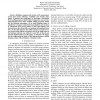Free Online Productivity Tools
i2Speak
i2Symbol
i2OCR
iTex2Img
iWeb2Print
iWeb2Shot
i2Type
iPdf2Split
iPdf2Merge
i2Bopomofo
i2Arabic
i2Style
i2Image
i2PDF
iLatex2Rtf
Sci2ools
119
click to vote
WIOPT
2010
IEEE
2010
IEEE
Saluki: A high-performance Wi-Fi sniffing program
Building a campus-wide wireless LAN measurement system faces many efficiency, scalability and security challenges. To address these challenges, we developed a distributed Wi-Fi sniffing program called Saluki. Compared to our previous implementation and to other available sniffing programs, Saluki has the following advantages: (1) its small footprint makes it suitable for a resource-constrained Linux platform, such as those in commercial Wi-Fi access points; (2) the frame-capture rate increased more than three-fold over tcpdump with minimal frame loss; (3) all traffic between this sniffer and the back-end server was secured using 128-bit encryption; and (4) the traffic load on the backbone network was reduced to only 30% of that in our previous implementation. In this paper, we introduce the design and the implementation details of this high-performance sniffing program, along with preliminary evaluation results.
Campus-wide Wireless Lan | Computer Networks | Distributed Wi-fi Sniffing | Sniffing Programs | WIOPT 2010 |
| Added | 15 Feb 2011 |
| Updated | 15 Feb 2011 |
| Type | Journal |
| Year | 2010 |
| Where | WIOPT |
| Authors | Keren Tan, David Kotz |
Comments (0)

